Local Government Fiscal Conditions
The Eureka County government provides a full range of services including police and volunteer fire protection, the construction and maintenance of sanitation, water and sewer (in town of Eureka only) facilities, recreational facilities including parks, swimming pool, museum, opera house, and fair and rodeo grounds, judicial services, economic development, medical facilities, road construction and maintenance, television services, Diamond Valley weed and rodent control, and senior citizen facilities. The unincorporated towns of Eureka and Crescent Valley are blended component units of the County government, and are reported in County financial statements as special revenue funds.
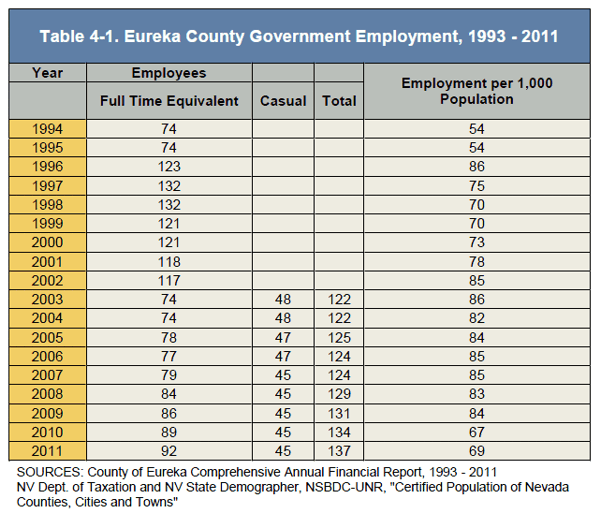
The County Auditor/Recorder prepares a Comprehensive Annual Financial Report at the end of each fiscal year; this report contains comprehensive information on County financial status, as well as other information required by Nevada statute. Most of the information in the following section is drawn from these reports from the years 1993 to 2011.
In 2011, principal officials of Eureka County consisted of a three-member Board of County Commissioners, an Auditor/Recorder, Clerk/Treasurer, Assessor, District Attorney, Sheriff, two Justices of the Peace, one in Beowawe Township (offices located in Crescent Valley) and one in Eureka, a Public Works Director, a Facilities Manager, two Senior center Coordinators, and an EMS Coordinator. In 2011, Eureka County had 137 government employees (Table 4-1 above). The 2011 employment is the highest during the last 18 years. However, the population of Eureka County has increased substantially in the last three years. As a result, government employment per 1,000 residents has actually declined to its lowest level since 1994. The proposed Mt. Hope project and other major mining ventures in Eureka County are likely to drive government employment higher in the coming years as more and more mining employees choose to reside in Eureka County. The Mt. Hope project could increase the population of southern Eureka County by more than 600 full-time residents within the next 5 years.
 |
 |
Eureka County Revenues — Eureka County uses fund accounting to ensure and demonstrate compliance with finance-related legal requirements. The county funds are divided into three categories: governmental funds, proprietary funds, and fiduciary funds. Eureka County maintains thirty-one individual government funds, one proprietary fund (the Devil's Gate General Improvement District), and one fiduciary fund. The tables and graphs here show trends in Eureka County revenues, both by fund and by revenue source. (Note: Some smaller revenue sources do not appear in the bar graphs due to the scale of the graph.)
Ad valorem taxes and intergovernmental revenues continue to be the two main sources of Eureka County revenues, with ad valorem taxes accounting for 58 percent and intergovernmental revenues accounting for 30 percent of total 2011 revenues.
Eureka County has a policy of retaining large ending balances and building up reserve funds. Eureka County has three reserve funds, including a Future Reserve Fund and a Building Operation and Maintenance Reserve Fund. The 2011 Comprehensive Annual Report explains the purpose of these funds as follows: “The County will rely on its Future Reserve Fund to help cushion the impact when a mine closes”.
A Building Maintenance Fund is in place to ensure proper maintenance of all County structures. The Regional Transportation Fund will hold reserve money for the specific purpose of constructing and maintaining county roads. These funds will give the citizens of the County a grace period to absorb the financial impact of such an event.
On June 30, 2011, the balance in the Future Reserve Fund was $9,453,730 and the balance in the Building Operation and Maintenance Reserve Fund was $5,637,083. The Road Fund had an ending fund balance of $6,286,543. The 2011 Comprehensive Annual Report further states that the county collected more revenue than it expended in fiscal year 2011. The Comprehensive Annual Report reports further financial highlights for fiscal year 2011:
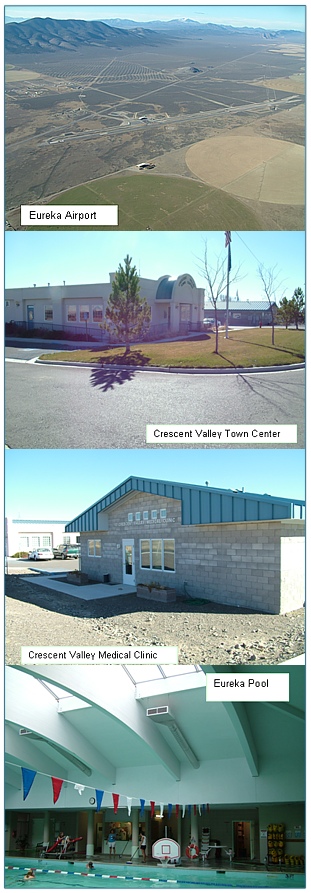 |
- The County expect an increase in sales tax revenues going forward. However, an increase in Net Proceeds of Mines is not expected.
- There were no new funds established and no funds were closed in 2011.
- The County as of June 30, 2011 had no bonded debt.
- General Fund cash increased $5,771,254. This increase was largely due to unbudgeted Net Proceeds of Mines revenue.
- At June 30, 2011, the total fund balance for the general fund was $16,157,202.
- Total County cash at June 30, 2011 was $59,556,058.
- There were no major leadership changes for Eureka County during fiscal year 2011.
Eureka County's Fiscal Policies Have Resulted In A Steadily Growing Reserve Fund Balance — As Figure 4-1 shows, Eureka County's fiscal policies have resulted in a steadily growing reserve fund balance resulting in a substantial reserve. Table 4-2 shows Eureka County revenues by source. Taxes and intergovernmental revenues are the primary sources of government funding. Both are highly influenced by economic conditions. Figure 4-2 shows the proportionality of general government revenue sources. Figure 4-3 graphs the growth in tax revenues by source over the last 18 years.
Eureka and Crescent Valley —
The town of Eureka, the county seat, is in the southern portion of the county, and Crescent Valley is located in the northern part of the county. Both towns are unincorporated. A 3-member Crescent Valley Advisory Board, under the authority of the Eureka County Board of County Commissioners, governs Crescent Valley.
The principal services provided by the town of Eureka are fire protection, streets and street lighting, water and sewer service, while Crescent Valley provides fire protection, streets, water, maintenance of a park, and some general government functions. The primary revenue source for Eureka Town is ad valorem tax followed by state gaming license fee.
The town of Crescent Valley is supported ad valorem tax revenues. Over the past several years, intergovernmental grants and the water improvement fund have been a major sources of revenues. Table 4-3 and Figure 4-4 shows Town of Eureka revenues by source. Table 4-4 and Figure 4-5 shows the Town of Crescent Valley revenues by source.
Eureka County Tax Rates —
The statutory maximum ad valorem tax rate is $3.64 per every $100 of valuation. Eureka County's total property tax rate in FY 2010-11 is 1.7743. This translates to a property tax impact of $677.88 on a home with a $100,000 taxable value (The assessed value, on which the ad valorem tax is levied, is set at 35 percent of the taxable value).
Actual combined tax rates vary according to area within Eureka County. The towns of Crescent Valley and Eureka levy $1.9896, while the Diamond Valley Rodent and Weed Control Districts levy $1.8924 (Table 4-5). The average overall property tax rate in the county is approximately the same as it was in FY 2002-03. Eureka County maintains one of Nevada's lowest average countywide tax rates. Table 4-6 shows the tax rates and assessed value by taxing units. Table 4-7 shows a history of assessed values by taxing district. Assessed value has increased substantially since 1994.
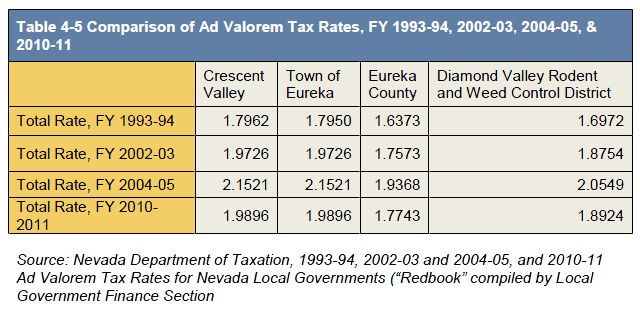 Total Assessed Valuation Dips Slightly in 02-03, Then Climbs — Since FY 1994-95, total assessed valuation in Eureka County, which consists of the area outside of incorporated towns and contains most of the county's tax base, has increased from $424.23 million in FY1994-95, to $1.416 billion in FY 2010-11, a increase of 234 percent. Increases in assessed value are largely attributed to mining operations in Eureka County (Figure 4-6).
Total Assessed Valuation Dips Slightly in 02-03, Then Climbs — Since FY 1994-95, total assessed valuation in Eureka County, which consists of the area outside of incorporated towns and contains most of the county's tax base, has increased from $424.23 million in FY1994-95, to $1.416 billion in FY 2010-11, a increase of 234 percent. Increases in assessed value are largely attributed to mining operations in Eureka County (Figure 4-6).
Declines in assessed value took place between FY 2001-02 and FY 2002-03. This drop in countywide assessed value was due to the re-valuation of several gold mining properties. Mines reported that due to lower returns and increased production costs the full cash value of their properties had diminished, and the taxable value of their property exceeded the current full cash value.
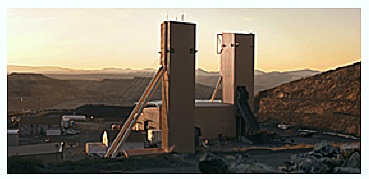 Nevada law does provide for the use of other indicators than those typically used to determine whether taxable value exceeds full cash value, so following state law and using the information submitted by the mining companies and other analysis, the Eureka County Assessor determined that the current estimated value of the properties was substantially lower than the previous estimate (replacement cost new less depreciation value) and certain mining properties were re-valued accordingly.
Nevada law does provide for the use of other indicators than those typically used to determine whether taxable value exceeds full cash value, so following state law and using the information submitted by the mining companies and other analysis, the Eureka County Assessor determined that the current estimated value of the properties was substantially lower than the previous estimate (replacement cost new less depreciation value) and certain mining properties were re-valued accordingly.
While total assessed valuation of the towns of Eureka and Crescent Valley are minor compared with the rest of the county, total assessed valuations in the towns increased during the FY 1994-95 to FY 2010-11 period. Assessed valuation in Eureka Town rose from $3.9 million to just over $10 million during the period (Figure 4-7).
In Crescent Valley, total assessed valuation climbed from $1.45 million in 1994-95 to 3.4 million in 1999-2000, but then dropped again to $2.99 million in FY 2005-06 and has remained relatively constant. Table 4-8 shows principal taxpayers in Eureka County. Again, mining dominates the list in Table 4-8.
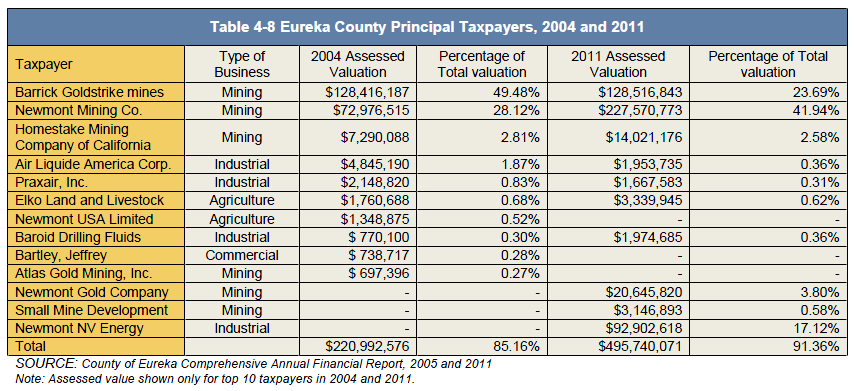
Eureka County Expenditures —
In 2011 the county expended a total of $27,824,071, an increase in spending of 25 percent from 1999 (Table 4-9). The General Government and Public Safety functions within the County's General Fund, together with the Road Fund are the largest County expenditure categories. General Fund expenditures make up 69.4 percent of County expenditures. As shown in Figure 4-8, revenues have generally outpaced expenditures, although both have risen in recent years.
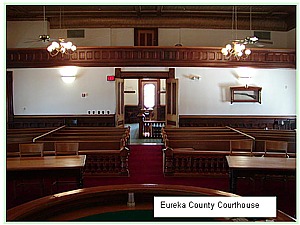
The County spent $71,763 and $125,122 from the Building Operation and Maintenance Reserve Fund in FY 2004 and 2005. No money was spent from the Future reserve Fund in those years. Figure 4-9 shows county expenditures and the expenditure trend for the years 1999 - 2011. Figure 4-10 shows General Fund expenditures from 1999 to 2011. Although government expenditures have increased in recent years, the total amount spent for general government functions such as public safety and administration has not experienced the same level of increases (Figure 4-11) suggesting that many of the expenditures are being made for non-recurring items such as capital improvements.
Eureka Town and Crescent Valley Expenditures —
Public works and public safety are the principal functions of the town of Eureka. Government expenditures; other functions - culture and recreation, general government, capital improvements, health, are a part of County expenditures. Crescent Valley is far from the county seat, so some government functions that are performed by the County in Eureka town are performed in the town in Crescent Valley, and expenditures reflect this. Similar to other governmental functions in Eureka County, expenditures have increased for the Town of Eureka and Crescent Valley (Table 4-10). Figure 4-12 shows 2011 expenditures by category.
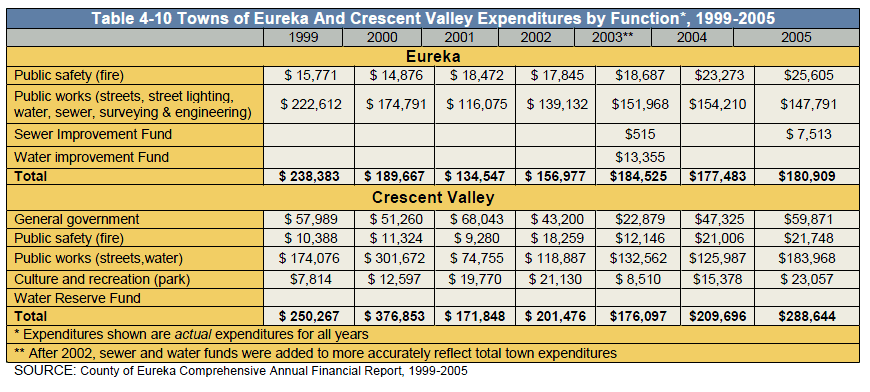
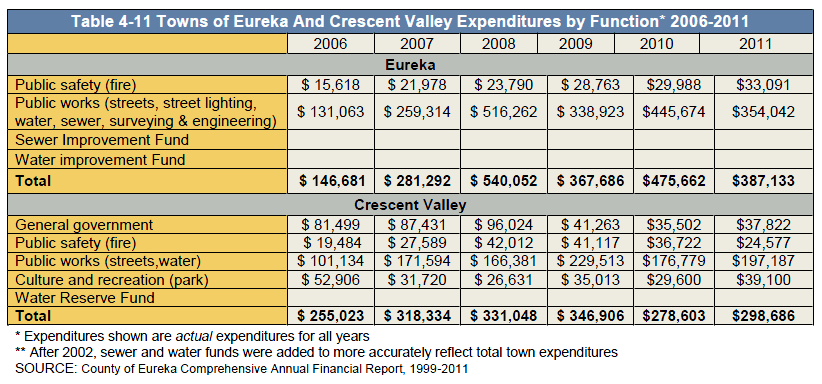
References:
1. Eureka County Government Employment
Comprehensive Annual Financial Report, County of Eureka, State of Nevada 2003-2011. 30 June 2003 - 30 June 2011. Mike Rebaleati, Eureka County Recorder/Auditor Department. The Eureka County Recorder/Auditor prepares a Comprehensive Annual Financial Report every year.
2. Eureka County Budget: Total Revenues by Fund
Comprehensive Annual Financial Report, County of Eureka, State of Nevada 2003-2011. 30 June 2003 - 30 June 2011. Mike Rebaleati, Eureka County Recorder/Auditor Department.
3. Towns of Eureka and Crescent Valley Revenue by Source
Comprehensive Annual Financial Report, County of Eureka, State of Nevada 2003-2011. 30 June 2003 - 30 June 2011. Mike Rebaleati, Eureka County Recorder/Auditor Department.
4. Eureka County Total Property Tax Rates by Taxing Unit
Ad Valorem Tax Rates for Nevada Local Governments ("Redbook" compiled by Local Government Finance Section) 1993-94, 2002-03 – 2012-13Nevada Department of Taxation (Prepared annually)
5. Comparison of Ad Valorem Tax Rates
Ad Valorem Tax Rates for Nevada Local Governments ("Redbook" compiled by Local Government Finance Section) 1993-94, 2002-03 2012-13 Nevada Department of Taxation (Prepared annually)
6. Eureka County Assessed Valuation by Sub-Area
Ad Valorem Tax Rates for Nevada Local Governments ("Redbook" compiled by Local Government Finance Section) 1993-94, 2002-03 - 2012-13 Nevada Department of Taxation (Prepared annually)
7. Eureka County Principal Taxpayers
Comprehensive Annual Financial Report, County of Eureka, State of Nevada 2003-2011. 30 June 2003 - 30 June 2011. Mike Rebaleati, Eureka County Recorder/Auditor Department.
8. Eureka County Budget:
Total Expenditures by Fund Comprehensive Annual Financial Report, County of Eureka, State of Nevada 2003-2011. 30 June 2003 - 30 June 2011. Mike Rebaleati, Eureka County Recorder/Auditor Department.
9. Towns of Eureka and Crescent Valley Expenditures by Function
Comprehensive Annual Financial Report, County of Eureka, State of Nevada 2003-2011. 30 June 2003 - 30 June 201. Mike Rebaleati, Eureka County Recorder/Auditor Department.
|

